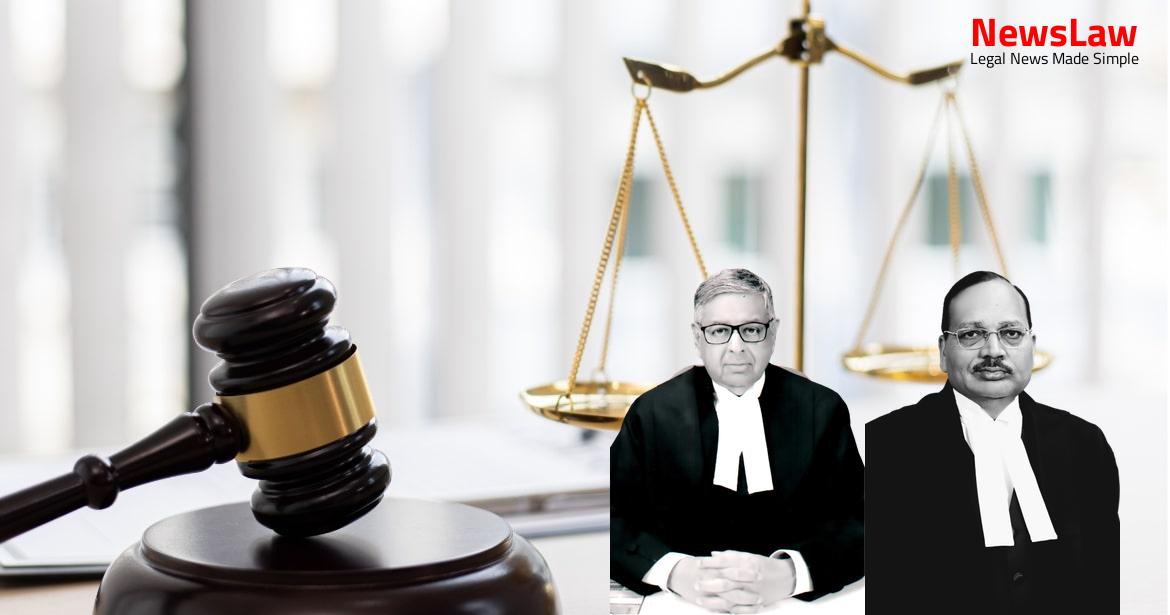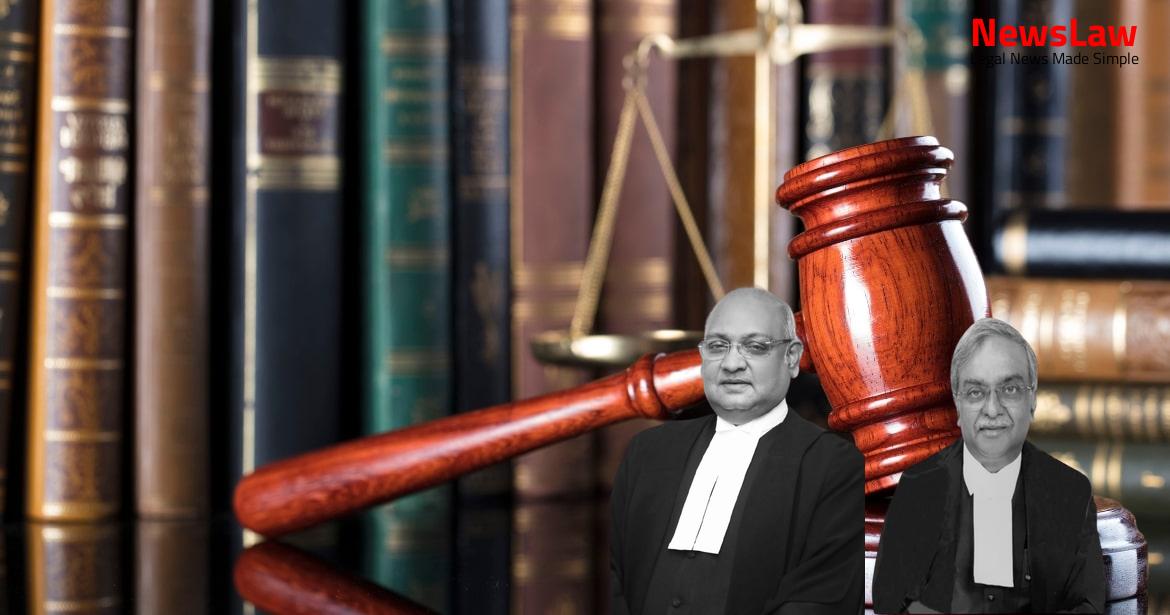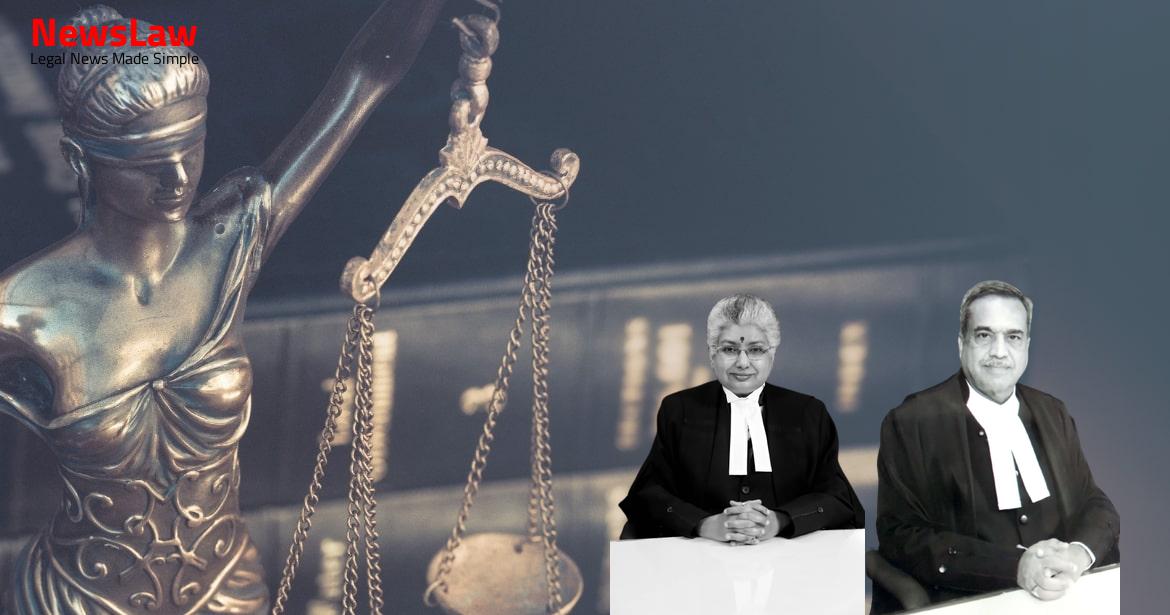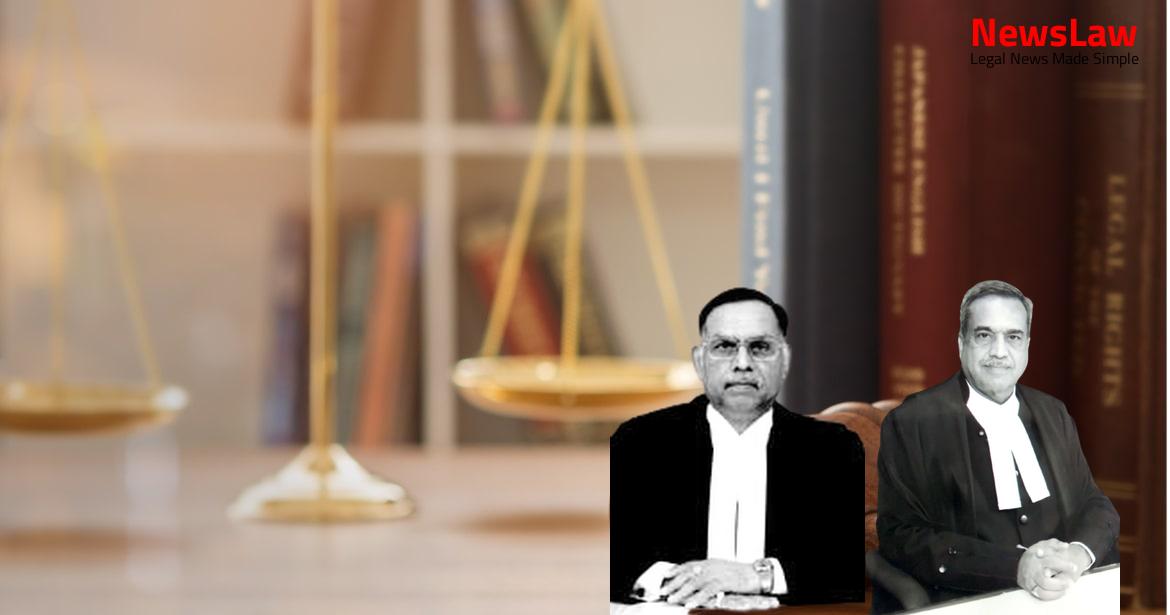Delve into a thorough legal examination of a crucial court case involving a dowry death conviction. The court’s in-depth analysis of the evidence and application of relevant legal provisions sheds light on the complexities of the case. This summary highlights the importance of precise legal interpretation and scrutiny in ensuring justice is served.
Facts
- The Trial Court convicted the appellant-husband, father-in-law, and mother-in-law under Section 304-B and sentenced them to seven years of rigorous imprisonment and a fine of Rs.5000 each.
- The High Court acquitted the father-in-law and mother-in-law but upheld the appellant’s conviction and sentence.
- Accused persons were directed to undergo rigorous imprisonment for one year in case of default of fine payment.
- The present appeal arises from the High Court’s judgment dated 15.03.2010, where the appellant’s conviction was upheld.
- Deceased informed complainant of physical assault by in-laws for dowry
- Complainant gave a gold chain to accused persons
- Deceased disclosed in-laws demanding money for car, complainant did not fulfill demand
- Accused persons appealed to High Court
- Deceased consumed poison, lost consciousness, and died
- Marriage between appellant and deceased solemnized in 2004
- Child born out of wedlock in 2006
Also Read: Electoral Malpractices in Mayor Election
Arguments
- The counsel on behalf of the appellant argued that without charges under Section 498A, IPC, a conviction under Section 304-B, IPC cannot be sustained.
- The deceased had informed her father about the latest demand for money for purchasing a car fifteen days before the incident.
- It was asserted that the death of the deceased occurring within seven years of marriage does not necessarily indicate cruelty related to dowry demands shortly before her death.
- The counsel on behalf of the accused-appellant contended that the presumption under Section 113B of the Evidence Act was applied without meeting the essential requirements of Section 304-B, IPC.
Also Read: Balancing Power and Transparency: Electoral Bonds Struck Down, Disclosure Mandated
Analysis
- Section 304-B(1), IPC defines ‘dowry death’ of a woman.
- Section 304-B(2), IPC provides punishment for the offense of dowry death.
- Dowry death is where death of a woman is caused by burning or bodily injuries, occurring within seven years of marriage, and linked to cruelty or harassment related to dowry demands.
- The punishment for committing dowry death is imprisonment for a term not less than seven years, which may extend to imprisonment for life.
- Sections 304-B and 498-A IPC deal with distinct offenses, although cruelty is a common essential to both.
- Explanation to Section 498-A provides the meaning of ‘cruelty’ which is crucial in establishing the offense.
- Trial Courts must ensure a fair examination of the accused under Section 313, CrPC, as it is fundamental to natural justice.
- Defense preparation by the accused’s counsel is crucial under Section 304-B, IPC read with Section 113-B, Evidence Act.
- The prosecution must establish the necessary ingredients for constituting an offense under Section 304-B, IPC.
- Guidelines from Satbir Singh v. State of Haryana regarding careful trial conduct under Section 304-B, IPC should be followed diligently.
- The menace of dowry death is increasing day by day, with the accused being arrested on 10.8.08.
- The absence of signatures on Ex.Dl by the accused indicates key information missing.
- Section 113-B of the Evidence Act creates a presumption of causality once certain criteria are met.
- The mother of the deceased had informed the father about harassment due to dowry before the incident.
- The failure of the appellant to present evidence to contradict the testimony strengthens the case for conviction under Section 304-B, IPC.
- The sentencing guidelines set by the Court must be followed by the presiding judge for appropriate punishment.
- The prosecution successfully established the necessary ingredients under Section 304-B, IPC, activating the presumption under Section 113-B of the Evidence Act.
- The existence of a ‘proximate and live link’ between dowry death and harassment must be proven.
- The Trial Court’s conclusion was based on a detailed analysis of evidence, deemed reliable and consistent.
- The marriage between the deceased and accused occurred in 2004, with her death in 2008, satisfying key criteria under Section 304-B, IPC.
- The presence of dowry demand ‘soon before her death’ is crucial, as highlighted in previous court judgments.
- The defence’s argument of a cordial relationship is refuted by forged hospital records, undermining the appellant’s credibility.
- Family members of the husband are sometimes roped in even if they have no active role in the offense and are living far away.
- Courts should be cautious in such cases.
- High Court and Trial Court were not in error in convicting the appellant under Section 304-B, IPC as the burden of proof under Section 113-B, Evidence Act was not discharged by the appellant.
Also Read: Recall of Resolution Plan Approval: Legal Analysis
Decision
- The appellant did not present any material for the Court to intervene in the impugned judgment.
- The appeal has been dismissed.
- Any pending applications have been disposed of accordingly.
Case Title: GURMEET SINGH Vs. THE STATE OF PUNJAB (2021 INSC 299)
Case Number: Crl.A. No.-001731-001731 / 2010



